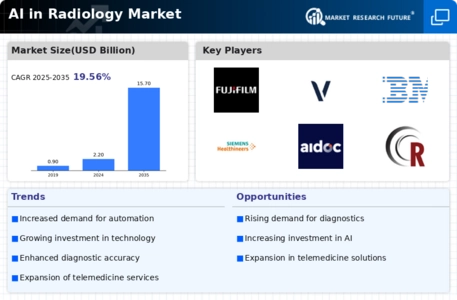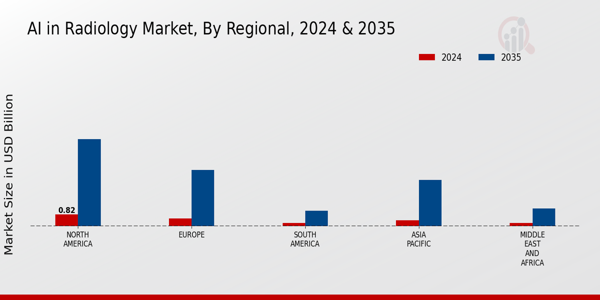Growing Aging Population
The Global AI in Radiology Market Industry is also driven by the growing aging population, which is more susceptible to chronic diseases requiring regular imaging and monitoring. As the demographic landscape shifts, healthcare providers are increasingly relying on AI technologies to manage the rising volume of radiological examinations. AI systems can efficiently process large datasets, enabling radiologists to focus on complex cases while ensuring timely reporting for routine scans. This demographic trend underscores the necessity for AI integration in radiology, as it addresses the challenges posed by an aging population and the corresponding increase in healthcare demands.
Market Growth Projections
The Global AI in Radiology Market Industry is projected to experience substantial growth over the next decade. With a market valuation of 2.2 USD Billion in 2024, it is anticipated to reach 15.7 USD Billion by 2035. This growth trajectory indicates a compound annual growth rate (CAGR) of 19.56% from 2025 to 2035. Such projections highlight the increasing integration of AI technologies in radiology practices worldwide, driven by advancements in imaging techniques, rising healthcare expenditures, and a growing demand for early diagnosis.
Rising Healthcare Expenditure
The Global AI in Radiology Market Industry is benefiting from increasing healthcare expenditure across various nations. Governments and private sectors are investing heavily in healthcare infrastructure, which includes the adoption of AI technologies in radiology. This trend is particularly evident in developed regions, where healthcare budgets are expanding to incorporate advanced diagnostic tools. As healthcare spending rises, the integration of AI in radiology is becoming more feasible, leading to improved patient care and operational efficiencies. This financial commitment is expected to further stimulate market growth in the coming years.
Increasing Demand for Early Diagnosis
The Global AI in Radiology Market Industry is significantly influenced by the rising demand for early diagnosis of diseases. As healthcare systems worldwide prioritize preventive care, AI technologies are being integrated into radiology practices to facilitate timely and accurate diagnoses. For example, AI tools can assist in identifying early-stage cancers, which is crucial for improving patient outcomes. This growing emphasis on early detection is likely to propel the market forward, as healthcare providers seek to adopt AI solutions that enhance diagnostic capabilities and streamline workflows.
Technological Advancements in Imaging
The Global AI in Radiology Market Industry is experiencing rapid growth due to continuous technological advancements in imaging modalities. Innovations such as deep learning algorithms and enhanced imaging techniques are improving diagnostic accuracy and efficiency. For instance, AI algorithms can analyze radiological images with remarkable precision, often outperforming human radiologists in detecting anomalies. This technological evolution is projected to drive the market from a valuation of 2.2 USD Billion in 2024 to an estimated 15.7 USD Billion by 2035, reflecting a robust compound annual growth rate (CAGR) of 19.56% from 2025 to 2035.
Regulatory Support and Standardization
The Global AI in Radiology Market Industry is witnessing enhanced regulatory support and standardization efforts aimed at facilitating the adoption of AI technologies. Regulatory bodies are establishing guidelines and frameworks to ensure the safe and effective use of AI in medical imaging. This support is crucial for building trust among healthcare providers and patients regarding AI applications. As regulations evolve, they are likely to create a more conducive environment for innovation, encouraging the development and deployment of AI solutions in radiology. This regulatory landscape is expected to play a pivotal role in shaping the future of the market.



















